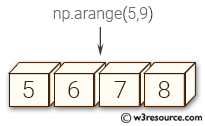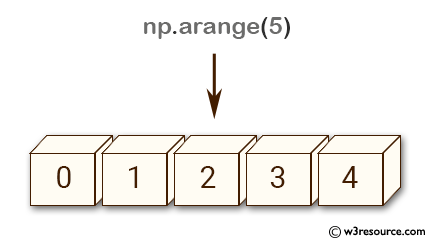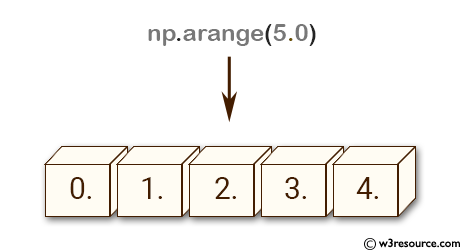NumPy: arange() function
numpy.arange() function
The arange() function is used to get evenly spaced values within a given interval.
Values are generated within the half-open interval [start, stop]. For integer arguments the function is equivalent to the Python built-in range function, but returns an ndarray rather than a list.
When using a non-integer step, such as 0.1, the results will often not be consistent. It is better to use linspace for these cases.
Syntax:
numpy.arange([start, ]stop, [step, ]dtype=None)

Version: 1.15.0
Parameter:
| Name | Description | Required / Optional |
|---|---|---|
| start | Start of interval. The interval includes this value. The default start value is 0. | Optional |
| stop | End of interval. The interval does not include this value, except in some cases where step is not an integer and floating point round-off affects the length of out. | Required |
| step | Spacing between values. For any output out, this is the distance between two adjacent values, out[i+1] - out[i]. The default step size is 1. If step is specified as a position argument, start must also be given. | Optional |
| dtytpe | The type of the output array. If dtype is not given, infer the data type from the other input arguments. | Optional |
Return value:
arange : ndarray - Array of evenly spaced values.
For floating point arguments, the length of the result is ceil((stop - start)/step). Because of floating point overflow, this rule may result in the last element of out being greater than stop.
NumPy.arange() method Example - 1:
>>> import numpy as np
>>> np.arange(5)
array([0, 1, 2, 3, 4])
>>> np.arange(5.0)
array([ 0., 1., 2., 3., 4.])
Pictorial Presentation:


NumPy.arange() method Example - 2:
>>> import numpy as np
>>> np.arange(5,9)
array([5, 6, 7, 8])
>>> np.arange(5,9,3)
array([5, 8])
Python - NumPy Code Editor:
Previous: loadtxt()
Next: linspace()
- New Content published on w3resource:
- HTML-CSS Practical: Exercises, Practice, Solution
- Java Regular Expression: Exercises, Practice, Solution
- Scala Programming Exercises, Practice, Solution
- Python Itertools exercises
- Python Numpy exercises
- Python GeoPy Package exercises
- Python Pandas exercises
- Python nltk exercises
- Python BeautifulSoup exercises
- Form Template
- Composer - PHP Package Manager
- PHPUnit - PHP Testing
- Laravel - PHP Framework
- Angular - JavaScript Framework
- Vue - JavaScript Framework
- Jest - JavaScript Testing Framework
